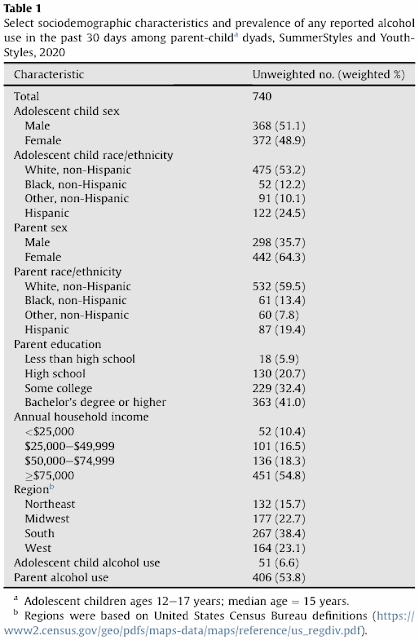However, it is not easy to research this topic in any formal way. After all, we cannot do the sort of standard scientific experiment where we manipulate the world to see what effect our changes have. So, we are stuck with what are called “correlative surveys”, where we quantify both parental and child drinking, to assess the degree to which they are correlated.
Sadly, such experiments are not necessarily easy, as I discuss here.
A specific example that I will discuss here was published as: Associations between parental drinking and alcohol use among their adolescent children: Findings from a national survey of United States parent-child dyads (Michele K. Bohm and Marissa B. Esser. Journal of Adolescent Health 73: 961–964, 2023). This study examined associations between parent and child drinking using recent United States national survey data:
We analyzed responses of 740 parent—child dyads from 2020 SummerStyles and YouthStyles surveys. Parents and their adolescent children answered questions about past 30-day alcohol use ... An adult answered the first survey and, if applicable, one of their children ages 12—17 answered the same questions in the second survey.The results are straightforward, as presented in the publication:
We estimated prevalence of adolescent drinking and explored differences by socio-demographics ... Overall, 6.6% of adolescents drank alcohol, with no significant differences by socio-demographics. Adolescents whose parents drank frequently (≥5 days/month), or binge drank, had significantly higher odds of drinking than adolescents whose parents did not drink or did not binge drink, respectively.Unfortunately, the problem with this sort of descriptive experimental approach is that the researchers do not have any control over the sample of people surveyed. If there is any bias in the sampling of the people, then there is nothing that can be done about it. In this case, the characteristics of the sampled people are shown in this table.
A look through these numbers reveals several characteristics that are likely not representative of the overall US population:
- two-thirds of the parents are female
- three-quarters of the parents have some tertiary education
- more than half of the parents earn a lot of money
- half of the parents do not drink.
This does not in any way down-play the potential effects of parental drinking behavior on their children. An earlier publication (Michael Windle. Effect of parental drinking on adolescents. Life-Stage Issues 20: 181–184, 1996) correctly noted:
It is evident that parental alcohol abuse may have a range of potential adverse effects on adolescents. Problem drinking by parents may influence role—modeling behaviors, parenting skills, and marital and family relations, all of which may contribute to a host of problematic outcomes for adolescents.Nor, of course, does this preclude any attempt to do better studies. However, this is not easy in this case. For example, a survey paper (Ingeborg Rossow, Patrick Keating, Lambert Felix & Jim McCambridge. Does parental drinking influence children’s drinking? A systematic review of prospective cohort studies. Addiction 111: 204–217, 2015) involving a search for what is often considered to be the best sort of experiment in this situation (called: prospective cohort studies) found that:
Four of the 21 included studies filled several, but not all, criteria and were assessed to have some capacity for causal inference. These four studies found some evidence that parental drinking predicted drinking behaviour in adolescent offspring. The remaining 17 studies had little or no such capacity.
Mind you, children to not necessarily copy their parents’ behavior. For example, it has recently been pointed out that the current generation of young adults do not seem to be all that keen on consuming alcohol (How is Gen Z approaching beverage alcohol?):
Younger, legal-drinking aged Gen Z consumers increasingly enjoy a very different relationship with alcohol versus older age cohorts, exhibiting rising levels of abstention, moderation, experimenting with new categories, and turning away from traditional, high-volume categories, ... although there are wide variations between individual countries.So, it seems that the youngest generation of adults have not copied their parents’ (Millennials) drinking habits. Indeed, this blog may be coming progressively redundant. I hope not!




No comments:
Post a Comment